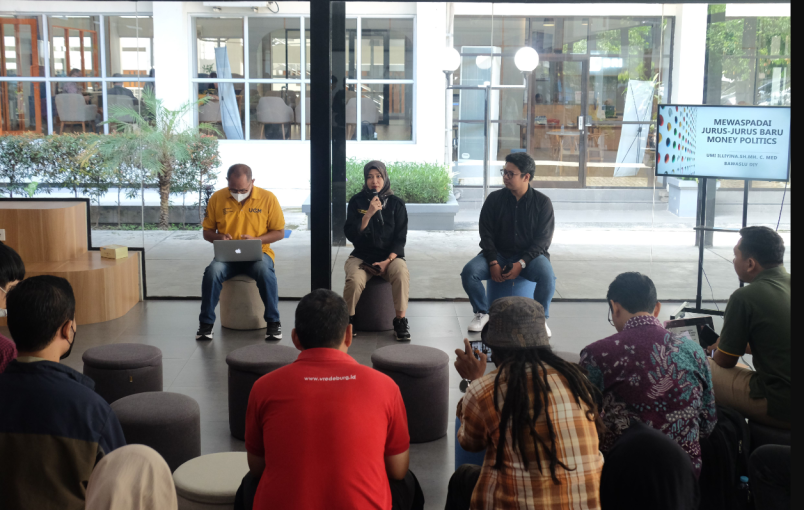
Yogyakarta, February 13th 2024─Ahead of the 2024 elections, Election Corner and the General Election Supervisory Agency (Bawaslu) held a discussion with the media on Tuesday (13/2) at the Faculty of Social and Political Sciences UGM. The discussion titled “Beware of New Money Politics Methods” was held to urge the public to be more vigilant in giving their voting rights.
“Although money politics is not new, the mode is different now. If in the past it usually came in the form of cash, now it is more varied. For example, in the form of Umrah, promises, or there is also cash but promised after being elected. This is what we from Bawaslu find very difficult to detect,” said the Head of Bawaslu Yogyakarta Special Region, Umi Illiyina. The most difficult mode of money politics to detect is in non-cash forms, such as providing basic necessities. Umi said, apart from the increasingly diverse modes of money politics, Bawaslu’s difficulties also lie in regulations and a long reporting process.
Even so, monitoring and surveillance efforts are still intensive. Yogyakarta is listed as one of the top 10 provinces prone to money politics. Preventive and repressive efforts were made. Umi said Bawaslu had conducted a number of socializations and appeals to political parties. “Fortunately, this year, they want to cooperate. We communicate and urge them not to do money politics. Critical periods starting today, until 9 pm, and tomorrow morning will be prone to political attacks, dawn attacks. So, we hope that because Bawaslu also has limited resources, hopefully the community can also be committed to guarding our elections,” said Umi.
The mode of money politics has also evolved based on its purpose. If usually the giver wants the recipient to vote for the nominated candidate, this time money politics also aims to prevent people from voting for certain candidates. This has been clearly regulated in the law. Even for election participants, both from party groups, candidates, and the community who openly carry out money politics on the day of the election, punishment or sanctions will be given individually. This rule causes people to potentially be individually sanctioned regardless of the cause and purpose.
Besides Bawaslu, political observer and lecturer of Department of Political Science and Government (DPP), Faculty of Social and Political Sciences UGM, Dr. rer.pol. Mada Sukmajati, M.PP. “Some old patterns, we can actually get the big pattern of money politics. We should all be aware, it could be from the law, organizers, or election participants. The potential for money politics in the form of fresh money ahead of election day will be even greater. This form of money politics is what people like, and that’s why before the day of implementation the rules target everyone,” said Mada.
According to Mada, the existence of a structured money politics system that continues to exist in every election makes people have a preference as recipients. The nominal amount of money or goods intended for vote buying is no longer important, but rather who gives it last. Mada also criticized how social assistance from the government can be a part of disguised money politics.
“Our society still looks at who gives. So, when given, there is a sense of returning the favor. Legally, social assistance is indeed in the government program, but the budget has increased dramatically, especially ahead of this election, which also needs to be watched out for. The frontline of our elections is the voting stage tomorrow. All election participants will say let the people decide, but if you don’t guard it, it could be just part of the manipulation process,” said Mada.
